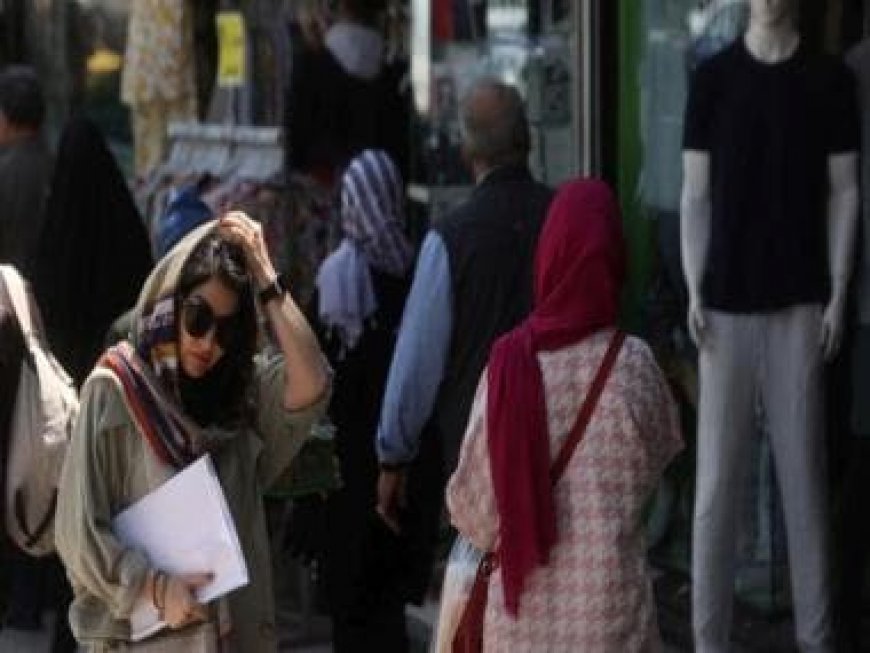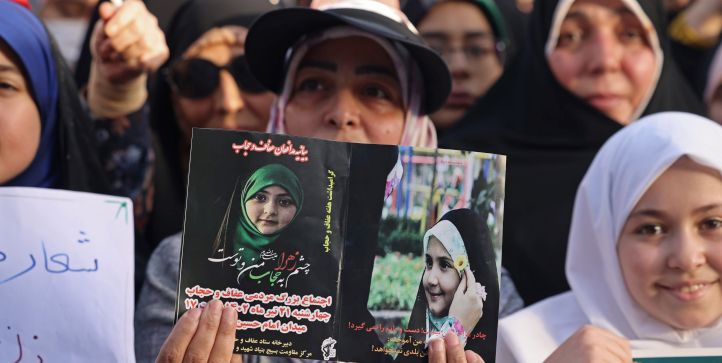More prison time, huge fine: What Iran’s harsh new hijab law could look like
More prison time, huge fine: What Iran’s harsh new hijab law could look like

Two weeks ago, Iran’s infamous “mortality police” started patrolling the streets to reinforce the controversial hijab rules. Now the country, which saw unprecedented protests last September after the death of Mahsa Amini in police custody, is mulling another draconian new bill to enforce wearing the veil.
The hijab is mandatory in Iran and authorities crack down on women whose head covering is not deemed appropriate. Those who have breached the rules are arrested and taken to what the police call re-education facilities.
The rules are already stringent so what will a new bill entail?
What are the new hijab rules Iran is mulling?
According to experts, Iran is expected to introduce even harsher punitive measures into the law, reports CNN.
The hijab and chastity bill is aimed at detaining and penalising women who do not observe the strict dress code in the Islamic Republic. Failure to cover the head would be considered a more severe offence, which would attract stiffer penalties – five to ten years prison sentence and fines of up to 360 million Iranian rials (Rs 7 lakh).
As of now, Article 368 of the Islamic penal code is considered the hijab law. It states that those who defy the dress code face between 10 days to two months in prison and a fine of anywhere between 50,000 to 500,000 Iranian rials (Rs 97 to Rs 977).
Hossein Raeesi, Iranian human rights lawyer and adjunct professor at Carleton University in Ottawa, Canada, told CNN that the new fine is far beyond was the average Iranian can pay, as millions live below the poverty line.

Apart from longer prison sentences for women who refuse to wear the hijab, the new draft law also proposes harsher penalties for celebrities and businesses who flout the rules and the use of artificial intelligence to identify defiant women.
Businessmen who do not enforce the mandatory hijab rule for women employees will be fined about three months of the profit they make. They might also face bans on leaving the country and participating in public or cyber activity for two years.
Celebrities who break the rules will have to pay up to a tenth of their wealth as a fine. They are likely to be excluded from employment and professional activities for a specified period and banned from international travel and social media activities, according to a CNN report.
Article 50 of the bill says that anyone who appears in public in a state of nudity or seminudity or in clothes that are too revealing will be apprehended by authorities and handed over to the judiciary. They will face imprisonment or a fine.
The new rules also spell out punishment for those who have insulted the hijab, promoted an improper hijab, or promoted immodesty or nudity. They will be sentenced to a fine and, at the discretion of the judicial authority, will be banned from leaving Iran and prohibited from public activity on the internet for six months to two years.

The draft law also calls for broader gender segregation in universities, administrative centres, parks, tourist hubs, and hospitals.
The bill empowers three intelligence agencies, the Ministry of Intelligence, the Revolutionary Guards Intelligence Organisation, and the Intelligence Organisation of the Judiciary to take action against women breaking the rules along with the police, the Basij paramilitary forces, and the Command of Enjoining Good and Forbidding Wrong, reports RFE/RL.
Also read: Iran’s Gasht-e-Ershad returns: How Muslim nations use morality police to crush women
When will the law come into force?
The judiciary submitted the bill to the government earlier this. It was forwarded to the parliament and has received a nod from the judicial and legal committee of the legislature.
On Sunday, it will be submitted to the Board of Governors before it is introduced on the floor of parliament, reports CNN, quoting the state news agency Mehr.
In the next two months, Iran’s parliament will finalise the text and vote on the bill.

Why is Iran tightening its hijab laws?
After Amini’s death, the country was gripped by never-seen-before protests, where women and students poured into the streets against the Iranian regime. The anti-hijab demonstrations soon spread to other parts of the world.
Following the protests, the mortality police (Gasht-e-Ershad) was pulled back but never officially disbanded. Now as the demonstrations have taken a backseat, the police are back patrolling the streets.
“The police will take legal action against those who, unfortunately, continue to break the dressing norms regardless of the consequences of doing so,” said Saeed Montazer al-Mahdi, spokesman of the Law Enforcement Force of the Islamic Republic, last month.
The new bill is seen as a response to last year’s protests.

How have Iranians reacted?
Legal experts are saying that the new hijab bill violates civil rights.
Lawyer Sara Bagheri told Tehran-based Tejarat News that the proposed legislation is against individuals’ rights including their right to security and will hurt individuals’ reputation and dignity on account of their chosen style of clothing.
Shima Ghousheh, a law expert, wrote in the reformist Etemad newspaper, “The country’s whole budget should be used to build prisons for women because many Iranians will not be able to pay these [heavy] fines and should be sent to prison.”
Also read: Hijab is not a choice: Indian women should learn from Iranian protests
When was the hijab made mandatory in Iran?
In 1936, the hijab was barred during the leadership of Reza Shah. However, the ban was lifted by his successor in 1941. It was only in 1983 that the hijab was made mandatory after the last shah was overthrown in the Islamic Revolution of 1979.
Since then, the laws to restrict women have only become more stringent.
Iran’s morality police, formally known as Gasht-e-Ershad (Guidance Patrol), was established under hardliner President Mahmoud Ahmadinejad to “spread the culture of modesty and hijab”. They began patrols in 2006.
With inputs from agenices
What's Your Reaction?



























































